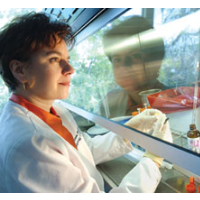How did a High-Security Lab Employee become Exposed to Bioterror Bacteria?
 A researcher at work in Tulane Center lab (photo: Tulane National Primate Research Center)
A researcher at work in Tulane Center lab (photo: Tulane National Primate Research Center)
Federal investigators have identified lapses in safety protocol that may explain how a lab worker at the Tulane National Primate Research Center near New Orleans may have been exposed to a dangerous bioterror bacteria.
The Centers for Disease Control and Prevention (CDC) reported that an employee at the primate center’s veterinary clinic experienced “possible current or prior exposure” to the bacterium Burkholderia pseudomallei, which can cause a fatal disease. The CDC added that the worker had so far shown no signs of illness related to the possible exposure.
The incident at first baffled investigators because the deadly bacterium managed to travel from a supposedly ultra-secure research lab to the hospital, which is in a separate building five minutes away.
In addition the employee, at least eight monkeys housed at the center were exposed to or sickened by the bacterium, which naturally lives and grows in the soil and water of Southeast Asia and northern Australia. Initially, in December, two rhesus macaque monkeys became sick as a result of the exposure and were eventually euthanized; a third one followed. None of the eight monkeys had been used in experiments involving the bacterium, and should have had no contact with it.
An investigation by the CDC and the Department of Agriculture’s (USDA) Animal and Plant Health Inspection Service (APHIS) “identified lapses in the appropriate use of personal protective equipment” at the center, according to a CDC news release.
“Specifically, the correct use of outer wear to prevent contamination of clothing beneath them, which could have led to the bacteria clinging to inner garments and getting carried out of the select agent lab where research was being conducted with the bacteria on mice. The bacteria could have been transferred this way to the breeding colony where the non-human primates resided and/or to the clinic where routine examinations and treatments were administered,” the CDC reported.
A USDA inspector investigating the bacteria release when it occurred last year became sick after visiting the Tulane primate center. She was found to have antibodies of the bacteria in her system, but they were not new and it was suspected that she became exposed during her travel to another country where the bacteria is common.
Other nations are reportedly studying the bacterium for possible use as a bio-weapon. Tulane researchers have been using it in experiments with rodents in an effort to develop a vaccine against it.
All lab research on the bacterium and other agents has been suspended until the CDC and the APHIS are satisfied that the problems which led to the contamination have been resolved.
The CDC reported that “it's unlikely there is any threat to the general population” from the bioterror bacterium because “no evidence to date” has been found “to suggest the organism was released into the surrounding environment” (meaning outside of their complex). However, a report from USA Today, which reviewed studies from the center, cast doubt on the thoroughness of the investigation, claiming that “too few tests were done” and “too few samples [from surrounding soil and water] were taken to detect what can be an elusive bacterium.”
The bacterium can hide in the human body for years without being detected, and can produce a disease called melioidosis, which has a 50% fatality rate.
- Danny Biederman, Noel Brinkerhoff
To Learn More:
Conclusion of Select Agent Inquiry into Burkholderia pseudomallei Release at Tulane National Primate Research Center (Centers for Disease Control and Prevention)
Worker At Tulane Possibly Exposed To Bioterror Bacteria (by Alison Young, USA Today)
Deadly Bacteria Release Sparks Concern At Louisiana Lab (by Alison Young, USA Today)
Probe of Tulane Primate Lab Blames Lapses for Bacteria Exposure (by Sara Pagones, The Advocate)
- Top Stories
- Unusual News
- Where is the Money Going?
- Controversies
- U.S. and the World
- Appointments and Resignations
- Latest News
- Trump Orders ICE and Border Patrol to Kill More Protestors
- Trump Renames National Football League National Trump League
- Trump to Stop Deportations If…
- Trump Denounces World Series
- What If China Invaded the United States?






Comments